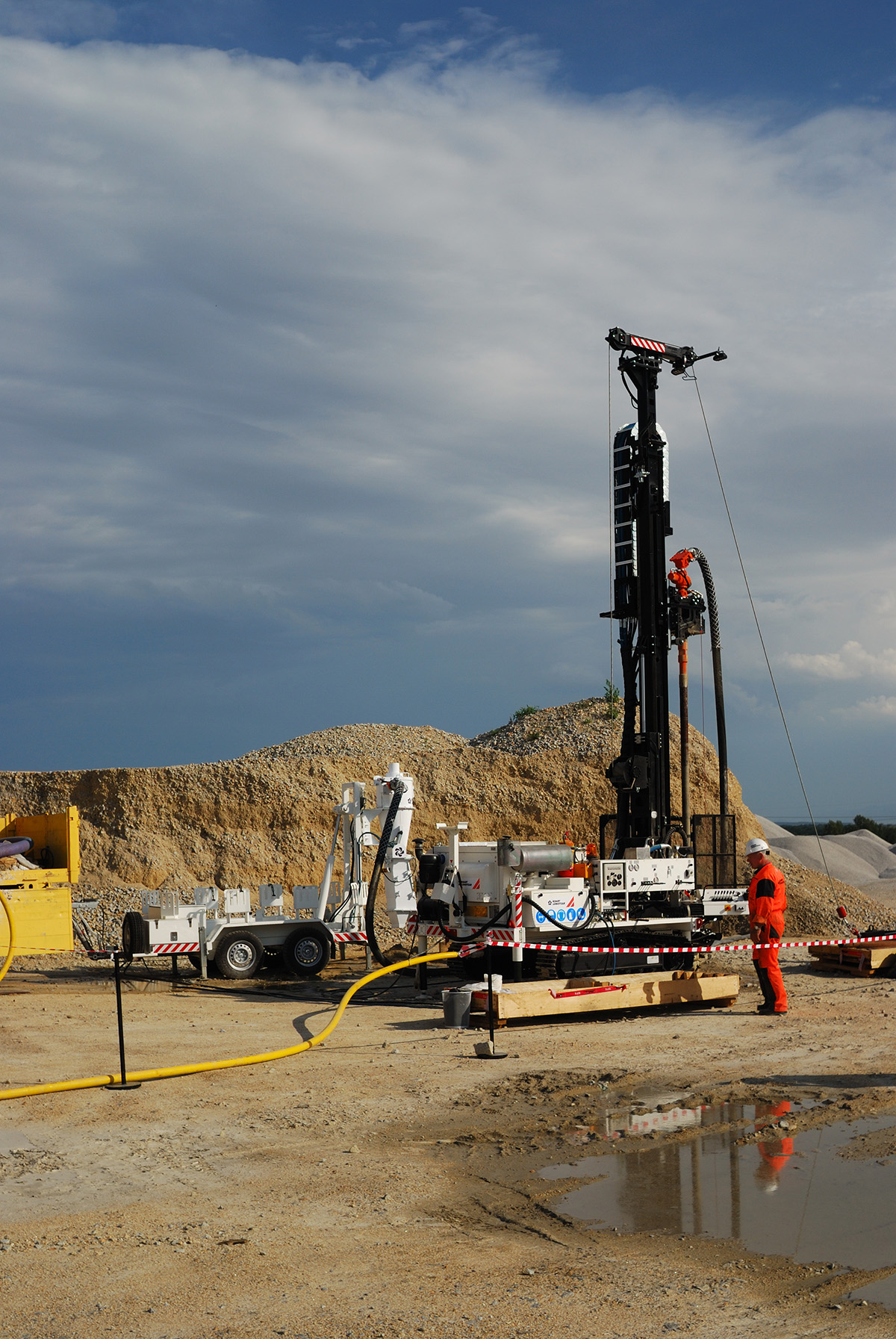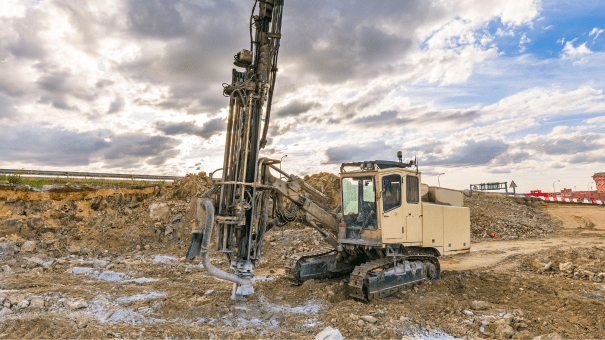A Comprehensive Overview: All About Geotechnical Engineering and Its Applications
A Comprehensive Overview: All About Geotechnical Engineering and Its Applications
Blog Article
The Importance of Geotechnical Design in Attending To Ecological Obstacles and Enhancing Construction Safety And Security
Geotechnical engineering offers as a cornerstone in the crossway of ecological stewardship and building safety and security, offering vital understandings into the habits of soil and rock under various problems. By applying calculated website investigations and tailored reduction actions, geotechnical designers play an important role in securing both human lives and eco-friendly integrity.

Role of Geotechnical Engineering
Geotechnical engineering plays a critical duty in the style and building and construction of framework by attending to the habits of dirt and rock products under different conditions. This field of engineering is necessary for understanding the interaction in between frameworks and the ground, which includes determining the load-bearing ability of dirt, assessing stability, and predicting potential settlement or failure.
Geotechnical designers are accountable for performing site investigations, which include tasting and testing dirt and rock to collect data on their chemical and physical buildings. This info is crucial for developing foundations, maintaining walls, and other earth-retaining frameworks that ensure security and long life. Moreover, geotechnical engineering informs the option of ideal building and construction methods and products, consequently decreasing risks related to soil actions.
Additionally, the assimilation of geotechnical design principles into urban preparation and environmental management is crucial for addressing obstacles such as ground contamination and groundwater management. By recognizing geotechnical aspects, engineers can create sustainable services that boost the durability of framework against natural risks, while additionally promoting environmental stewardship. Eventually, the role of geotechnical engineering is indispensable for achieving risk-free, sturdy, and ecologically aware construction methods.
Soil Erosion Mitigation
Dirt erosion postures a substantial danger to both environmental stability and facilities honesty, impacting around 24 billion tons of fertile soil lost every year worldwide. This sensation is exacerbated by factors such as deforestation, urbanization, and inadequate agricultural techniques. Geotechnical engineering plays a pivotal duty in developing effective soil disintegration reduction approaches that safeguard both the environment and building and construction jobs.
One approach entails the application of erosion control approaches such as vegetation planting, which stabilizes dirt with origin systems. In addition, the building of maintaining wall surfaces and terraces can efficiently lower surface drainage and protect at risk locations from disintegration. Proper drain style is additionally vital; it decreases water build-up and guides excess drainage away from essential frameworks.
Furthermore, geotechnical engineers employ dirt stablizing methods, such as the application of geotextiles and biodegradable mats, to boost dirt communication and avoid destruction - geotechnical specialist. Routine tracking and analysis of erosion-prone websites make it possible for prompt treatments, making certain long-lasting sustainability. By incorporating these techniques, geotechnical engineering not only reduces the influences of soil disintegration yet additionally adds to the strength of facilities against environmental challenges, inevitably cultivating a much safer and a lot more lasting built setting
Groundwater Security Approaches
Groundwater offers as an essential resource for drinking water, farming, and commercial processes, making its security important for ecological sustainability and public health. Reliable groundwater protection methods are vital in mitigating contamination risks and making certain the durability of this resource.

Regular monitoring of groundwater high quality is likewise crucial, making it possible for early detection of contamination resources and assisting in timely remediation efforts. Employing innovative technologies, such as geophysical studies and remote sensing, help in recognizing possible dangers to groundwater books.
Furthermore, you can try this out public education and stakeholder involvement are vital, promoting neighborhood support for groundwater security efforts. geotechnical engineer description. By integrating governing actions, technical advancements, and area participation, we can develop a thorough framework that safeguards groundwater sources while advertising sustainable development and building and construction techniques
Landslide Threat Administration
Landslides pose significant threats to both human security and framework, making reliable danger management techniques essential. Geotechnical design plays a critical role in recognizing, examining, and mitigating landslide threats. A detailed understanding of slope security, soil mechanics, and hydrology is essential for establishing reliable danger management plans.
The initial action in landslide risk monitoring includes detailed website examinations, which include geological mapping and soil testing. These investigations assist engineers assess the possibility for landslides by recognizing essential factors such as slope angles, soil composition, and water content. Making use of advanced modern technologies such as remote picking up and geophysical surveys can boost the precision of these evaluations.
As soon as threats are determined, appropriate reduction steps can be executed. These may include design options such as keeping walls, drainage systems, and incline stabilization strategies. Keeping track of systems need to be established to detect signs of ground activity and changes in water levels, enabling for positive treatments.

Enhancing Building Security
Construction websites typically present a myriad of threats that can threaten worker safety and project stability. Geotechnical design plays a crucial role in boosting building and construction security by providing vital understandings into subsurface problems. Via thorough soil and rock analysis, geotechnical designers can determine possible threats, such as soil instability, groundwater problems, and seismic susceptabilities, which may endanger the safety of building and construction tasks.
Implementing geotechnical solutions, such as correct foundation design and the usage of retaining structures, mitigates these dangers significantly. These services not just make sure the security of the frameworks being constructed but likewise develop a much safer working setting for building and construction employees.
Furthermore, fostering a society of safety through training and adherence to established security methods additionally enhances building and construction website safety and security. By integrating geotechnical expertise right into the planning and implementation stages, building and construction projects can accomplish higher safety and security criteria, ultimately safeguarding employees and making sure successful job conclusion.
Conclusion
To conclude, geotechnical design functions as an important discipline in tackling ecological challenges and promoting building and construction safety. Through reliable dirt erosion reduction, groundwater defense approaches, and landslide danger management, geotechnical designers add to the development of resistant framework. The assimilation of these practices cultivates see this page a more secure building environment and boosts the sustainability of civil engineering jobs. Ultimately, the know-how of geotechnical designers is indispensable in guarding both natural resources and human lives versus prospective risks.
Geotechnical engineering offers as a cornerstone in the intersection of ecological stewardship and building security, read this post here offering important insights right into the actions of dirt and rock under various problems. Geotechnical engineering notifies the option of proper construction approaches and products, consequently lessening dangers connected with dirt actions.
Geotechnical design plays a crucial duty in establishing reliable dirt disintegration reduction techniques that protect both the environment and construction tasks.
Moreover, geotechnical designers use soil stablizing techniques, such as the application of geotextiles and naturally degradable mats, to boost dirt communication and avoid destruction. Through detailed soil and rock analysis, geotechnical engineers can recognize potential risks, such as soil instability, groundwater issues, and seismic susceptabilities, which might endanger the security of building tasks.
Report this page